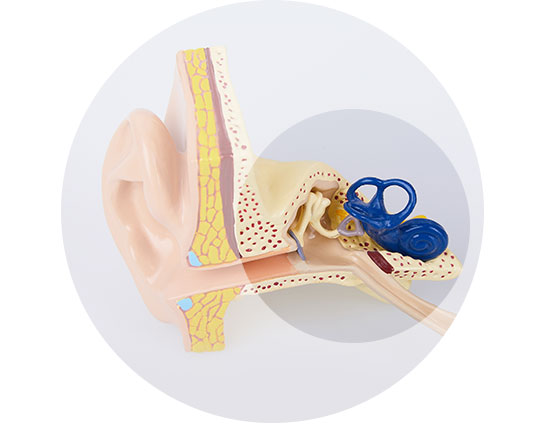Low-frequency hearing loss

What is low-frequency hearing loss?
People with low-frequency hearing loss have trouble hearing low-pitched sounds (sound frequencies at or below 2,000 Hz). Some examples of low-pitched sounds include men’s voices and bass sounds in music. The extent at which you have difficulty hearing these sounds will depend on your degree of low-frequency hearing loss.
This form of hearing loss mainly affects the volume of low-frequency sounds. Therefore, sounds at this pitch may seem quieter than they actually are.

Low-frequency sensorineural hearing loss
Sensorineural hearing loss can result in low-frequency hearing loss, meaning that low-frequency hearing impairment is caused by damage to the hair cells in a specific region of the cochlea (in the inner ear).
Since it is the hair cells’ role to ensure that sound travels from the outer ear to the brain, damage to these cells can seriously impact one’s ability to hear properly.

Book a FREE* hearing check for low-frequency hearing loss
What causes low-frequency hearing loss?
Low-frequency hearing loss can be present in both sensorineural and conductive forms of hearing loss. The causes may be genetic in nature or due to a result of a childhood illness.
Common factors that can cause low-frequency hearing loss include:
- Ear infections
- Otosclerosis
- Meniere's disease
- Heart disease
Tip from an audiologist
Since low-frequency hearing loss is less common than high-frequency hearing loss, it is a good idea to be aware of the signs and symptoms so that you can identify if you might have low-frequency hearing loss – and therefore seek professional advice.
However, it can be difficult to identify low-frequency hearing loss yourself, since many of the signs are similar to other forms of hearing loss. Educating yourself is still a great way to stay on top of your hearing health and learn how seeking treatment could be beneficial for your health.
When to take a hearing test
Signs and symptoms of low-frequency hearing loss
While it might initially seem fairly easy to "get by" when you have some subtle symptoms of low-frequency hearing loss, you will likely begin to miss out on important sounds, which can impact your quality of life.

Treatment for low-frequency hearing loss
Modern hearing aids are able to provide considerable support to people that suffer from this type of hearing loss.
While some people might feel that low-frequency hearing loss does not have as much of an impact on their daily lives as high-frequency hearing loss might have, the effects of low-frequency hearing loss can begin to take a toll on daily activities as the person begins to experience less and less of the sounds around them. It is therefore important to seek professional advice and support whenever any symptoms of hearing loss are present.
Sources
1. Niskar AS, Kieszak SM, Holmes A, Esteban E, Rubin C, Brody DJ. Prevalence of Hearing Loss Among Children 6 to 19 Years of Age: The Third National Health and Nutrition Examination Survey. JAMA. 1998;279(14):1071–1075. doi:10.1001/jama.279.14.1071
2. Parving A, Sakihara Y, Christensen B. Inherited sensorineural low-frequency hearing impairment: some aspects of phenotype and epidemiology. Audiology. 2000 Jan-Feb;39(1):50-60. doi: 10.3109/00206090009073054. PMID: 10749071.
3. MarkeTrak 10, Marketing Research, Inc.
4. https://www.tandfonline.com/doi/abs/10.3109/00206097809080043






